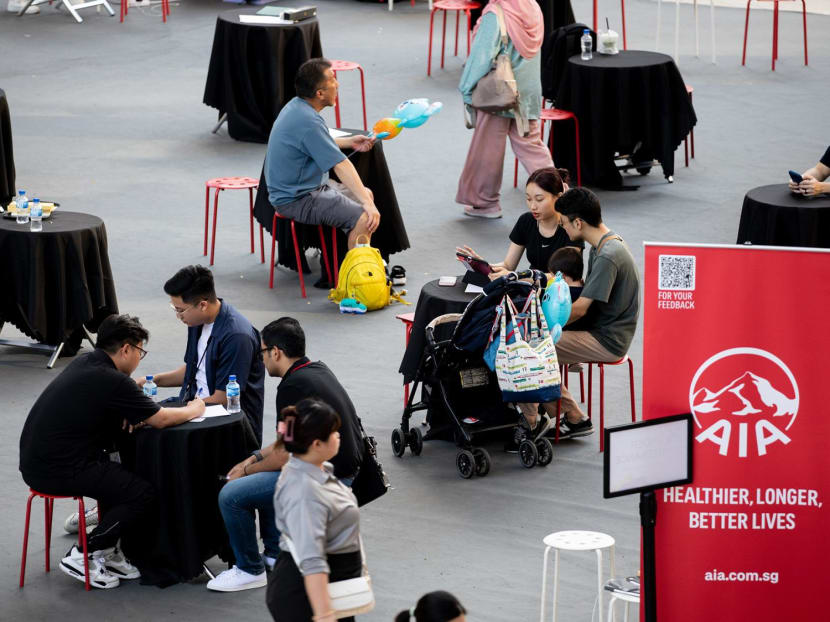'I just hope nothing happens to me': Why some young adults in S'pore face the future under-insured
SINGAPORE — With a passion for theatre and drama, and saddled with zero financial commitments, Mr Leonard Tan, 28, decided to “follow his heart” before working towards financial stability.


This audio is AI-generated.
- Many young adults in Singapore are under-insured, industry figures showed
- Various survey results found that a majority of Gen Z respondents lack coverage for critical illnesses and accidents
- Reasons for under-insurance included a focus on immediate goals, irregular income from non-traditional jobs, and a "live in the moment" mindset
- Some parents would buy insurance for their children but without updating policies, so young adults can still be under-protected
- Insurers said that closing this gap would require better education, tailored coverage, and engaging young adults through innovative methods
SINGAPORE — With a passion for theatre and drama, and having no financial commitments, Mr Leonard Tan decided to “follow his heart” before working towards financial stability.
On the upside, the 28-year-old has the freedom to pursue acting and hosting as a freelancer without worrying too much about money beyond his day-to-day expenses.
On the flipside, apart from the basic MediShield Life plan provided by the Government's Central Provident Fund Board, he has no insurance coverage should he be hit with an unforeseen turn of events.
“Financially, I’m not the most comfortable yet. Insurance can be an unnecessary expenditure. What if I never fall ill or get into an accident? Then I’ll be paying for nothing, right?Mr Leonard Tan, 28”
He told TODAY of his financial priorities: “Financially, I’m not the most comfortable yet. Insurance can be an unnecessary expenditure. What if I never fall ill or get into an accident? Then I’ll be paying for nothing, right?”
Asked if he had ever thought about unfortunate events happening to him and what he would do, Mr Tan said that buying insurance is not “totally out of the window” for him and he plans to get insured fairly soon.
“I know I can’t wait too long because the premiums will get more expensive the older I am. But I'm okay with the current situation. I just hope that nothing happens to me.”
Mr Tan is not alone. A recent TODAY commentary suggested that most young adults in Singapore are under-insured, as there is a clear shift in insurance needs and priorities among millennials and those in Generation Z.
Millennials have been grouped as those born between 1981 and 1996, and Gen Zers as those born from 1997.
Being under-insured means that you are not sufficiently covered for unexpected events, leaving you financially vulnerable to paying a significant portion of costs, such as an unforeseen health crisis, out of your own pocket.
Young adults are said by some observers to navigate life with a sense of invincibility, and some data supported this view.
In a survey last year by insurance firm FWD, more than 68 per cent of Gen Z respondents indicated that they did not have coverage for critical illnesses such as cancer and stroke.
A survey by Etiqa Insurance indicated that 55 per cent of younger Singaporeans showed low confidence in investing. Another 44 per cent felt the same about having sufficient means to build emergency funds.
It is worth noting in passing that both those firms, FWD and Etiqa, make money from selling insurance.
Separately, a study by the Life Insurance Association (LIA) showed that the issue of being under-insured is not exclusive to young adults. It reported a critical illness protection gap of 74 per cent, or S$579 billion, for economically active Singaporeans aged between 20 and 69.
This means that adequate protection needs amounted to S$783 billion, but the coverage bought was just S$204 billion, resulting in the 74 per cent gap.

“While they may understand the importance of being protected against financial uncertainties, Gen Z faces an ongoing dilemma because that generation of people also want to spend on current experiences that they enjoy such as dining, shopping and travel.Life Insurance Association's executive director Chan Wai Kit”
LIA's executive director Chan Wai Kit told TODAY that people aged 25 to 29 possibly have less financial ability to buy the insurance coverage they require and may not recognise the need as much compared to other priorities.
"While they may understand the importance of being protected against financial uncertainties, Gen Z faces an ongoing dilemma because that generation of people also want to spend on current experiences that they enjoy such as dining, shopping and travel."
TODAY spoke to several insurance firms and financial consultants to find out whether Gen Zers are significantly different from other age cohorts when it comes to buying insurance policies and what can be done to close the gap.
HOW IS GEN Z DIFFERENT?
Mr Raymond Ong, chief executive officer of Etiqa Insurance Singapore, said that several barriers prevent young adults who are still establishing themselves financially from buying insurance.
These barriers included economic uncertainty, fluctuations in the job market, and the rising cost of living, he said.
The shifting attitudes of Gen Zers towards work and financial planning also added layers of complexity.
“Gen Zers are more open to non-traditional employment arrangements, such as freelancing or entrepreneurship, which may result in irregular income streams and a lack of employer-sponsored benefits, including insurance coverage.”
Mr Ong also said that there is a perceptible trend among Gen Zers towards embracing a “live in the moment” ethos, which may inadvertently sideline long-term financial considerations such as insurance planning.
“As they focus on planning for these major purchases, insurance coverage often takes a backseat. This prioritisation of immediate goals over insurance means that their savings are frequently allocated towards these endeavours instead, leaving them under-insured.”
Mr Mark Czajkowski, chief marketing officer of insurer Manulife Singapore, echoed these points.
He pointed to a study that the firm ran this year, which showed that "having sufficient insurance" ranked eighth in priority in the long-term financial goals of the young adults surveyed.
Other goals such as saving for emergencies, travel, and home ownership take precedence.
“Most Gen Zers may not need to provide for their parents financially, and unless they are married, they may not see the need to get insured at all.Ms Pamela Chong, associate manager at Legacy FA, a financial advisory firm”
Ms Pamela Chong, associate manager at Legacy FA, a financial advisory firm, said that having a different mindset on family planning was also a contributing factor.
“Most Gen Zers may not need to provide for their parents financially, and unless they are married, they may not see the need to get insured at all,” she added.
“However, it is also worth noting that the trend now is that more of them are getting married later, and a large portion of them may not even want kids after seeing all the various sacrifices that their parents have gone through.”
As this mindset slowly becomes the norm among their peers, Ms Chong said that Gen Zers are likely to view paying insurance premiums as a form of liability instead of an asset.
WILL IT HELP IF PARENTS BUY INSURANCE FOR THEIR CHILDREN?
Mr Colin Chan, managing director for marketing at insurer Great Eastern, said that Singaporeans have become more affluent over the generations, so some parents have begun pitching in more to help their children buy insurance.
Likewise, Mr Ong of Etiqa said that parents of today’s young are more insurance-savvy, such that many young adults may own insurance coverage bought for them during their childhood or schooling years.
However, he said: “Without a comprehensive understanding of the scope and limitations of these policies, young adults may mistakenly assume they have adequate protection and end up under-insured.”
One millennial interviewed by TODAY fell into this category.
Account manager Eliza Wong, 30, said that she has not bought any personal insurance for herself despite knowing that it is good to acquire some form of protection.
She could only vaguely recall being covered by her mother’s extended family plan, which she does not know much about, including what she is insured for and how much.
“With so many options out there, it feels like I'm in a decision paralysis and also partly because (buying insurance) requires a lot of thought and research before committing to a plan,” she said.
“Very honestly, (insurance has) never been a big priority or something that occupies any brain space. And I think a big part of it is the lack of education and complacency.”

Another possible issue that arises if parents have bought insurance for their offspring is the need to update these policies as their children grow older, which some may forget to do.
Financial adviser Jack Foo, 35, said that parents might forget to check if better insurance plans are on offer today compared with the ones they bought for their children years ago.
“Parents, or the children themselves if they are financially capable, should also remember to increase the coverage requirements as inflation increases the general cost of living, including healthcare.”
HOW TO CLOSE THE GAP
So what more can insurers do to help close the gap?
Mr Ong of Etiqa said that insurers should refocus on engaging and educating younger consumers more effectively. They can also provide affordable coverage tailored to the younger demographic’s needs and circumstances.
“For example, while considerations of mortality might feel distant for many in this age group, the possibility of facing critical illnesses or accidents is likely to resonate with them.
“Insurers can prioritise initiatives that aim at simplifying the insurance process for Gen Zers and enhancing their financial education with regard to insurance as a financial safety net.”
Similarly, financial service consultant Edgar Tan, 36, said that specifically for Gen Z, it is about educating, creating awareness, and creating a sense of urgency for them to recognise the importance of insurance.
“Personally, I don’t find them more difficult compared to Gen X and Gen Y. We just need to find the right stories and lingo to engage them.”
On the other hand, Ms Chong of Legacy FA said that insurers could do more by making more creative and simple-to-understand short videos depicting the need for insurance coverage available. These may be shown in schools.
“This could start as early as primary level. The depth of the knowledge to be shared can slowly progress along with the education years,” she suggested, adding that this will give financial practitioners like her a headstart when engaging Gen Z or future generations on insurance planning.
From the young adults’ point of view, Ms Hannah Jamal, 27, said that it would be good if topics such as insurance coverage were introduced in schools, for example, during Character and Citizenship Education lessons.
“Also, generally, I do feel like many people avoid insurance agents. So maybe more education can be done through different methods instead of the traditional face-to-face interaction at roadshows or meet-ups because I think this scares the young ones.”
Ms Hannah, who is unemployed, said that she plans to review her plans soon with her financial adviser since she had bought basic health plans five years ago, where the coverage is for early stages of critical illness with a coverage limit of S$20,000.
Ms Wong, the account manager, said that she is likely to benefit from a national roadmap guide outlining the recommended plans for each age group or life stage.
"But I think it will take a lot of time to look into these things and there is inertia."
As for what she plans to do in the meantime, Ms Wong admitted that her siblings and friends have also asked her about getting insurance. "If something bad does happen, I'll probably regret not taking this more seriously at this stage.
"At the same time, life is life. I understand it's the consequence of my actions. But I don't plan on dying anytime soon."







